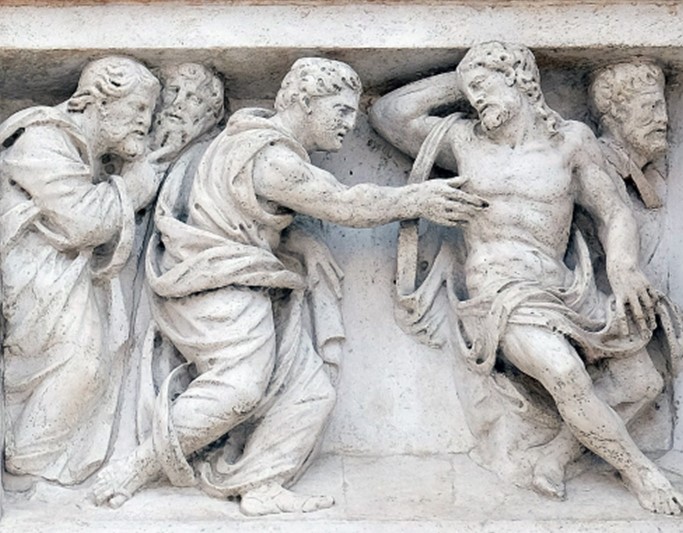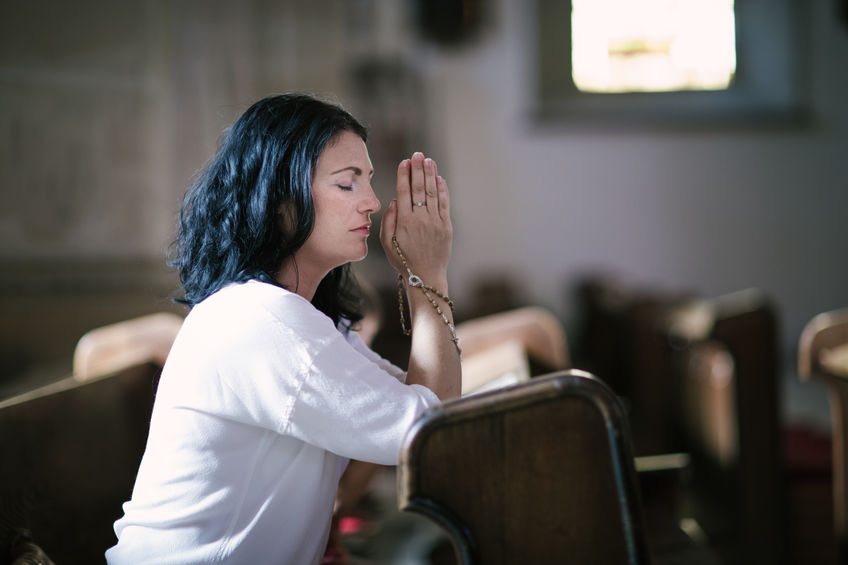Easter/Pentecost: A good time to question your religious, cultural, and personal beliefs and practices
By Robert Fontana
Yes, it is true. This is the good and proper season for questioning one’s belief systems. That’s what Thomas the apostle did after his friends claimed to have seen Jesus, whom Thomas knew was dead. Thomas responded, “Unless I see the mark of the nails in his hands and put my finger into the nail-marks and put my hand into his side, I will not believe.” John 20:25

Thomas probably expressed the doubt that some of the others also felt. In fact, Luke’s version does state that all the disciples present were disbelieving in what they were seeing: But they were startled and terrified and thought that they were seeing a ghost. Then he said to them, “Why are you troubled? And why do questions arise in your hearts? Look at my hands and my feet, that it is I myself. Touch me and see, because a ghost does not have flesh and bones as you can see I have.” Luke 24:37-43
Healthy doubting and questioning can lead to greater understanding and conviction. This has been true in my life. For example, in struggling to understand what it means to live as a Catholic Christian in a world with sincere believers of other religions – Protestant, Orthodox, Muslim, Hindu, Buddhist, Native American, and even sincere practitioners of no religion – I have wrestled with: Is my way right and their ways wrong? Can we all be right? Are we all somewhat right and somewhat wrong?
What I came to see through this questioning was that I had a wrong attitude about the non-Christian world. I used to believe that it was completely void of God, and we Catholics and other Christians were bringing God to the world. I was a Catholic fundamentalist, conquering the world for Christ. I was convinced that “the other side” has nothing to offer, that they needed to surrender to my monologue of truth. When I came to see that God’s grace and presence abound in every human person and culture, that I have a truth to share but so do others, then I learned that respect and dialogue had to be at the core of my relationship with them.
Having the courage and skill to question one’s belief system is essential for mature spirituality and responsible engagement in the Church and in civic society today. This is especially true considering the influence of social media and the “either/or thinking” of both the left and the right in today’s Church and society. It also takes into consideration the modern levels of corruption that abound.
Many Catholics would not agree with this statement. Question the Church…or my pastor? Never!

My mother once told me that she tithed weekly to the parish because that was her duty to God. What the pastor did with the money was his duty to God and not her concern. I told my mother that her way of thinking was a recipe for financial mismanagement in the church (she didn’t like hearing that). But apparently the bishops at the Second Vatican Council thought as I did because, although the bishops recommended parish councils in each parish, finance councils were mandated. Leading up to the Vatican Council in 1962, problems with incompetence and actual criminality among managers of the church’s financial resources were acknowledged. Sadly, these problems continue today:
The Michigan priest—pastor of the same parish for 30 years—who was convicted of stealing $573,000…for stock market investments and alcohol; the Philadelphia Archdiocese CFO who embezzled nearly a million dollars (gambling habit); the New York Archdiocese employee who embezzled nearly a million dollars to purchase additions to her expensive doll collection; the Florida monsignor who was accused of stealing as much as $8 million over his 40 years as pastor, [money] …used to purchase real estate and take expensive vacations with his mistress… (https://uscatholic.org/articles/201701/how-to-stop-embezzlement-in-your-parish/)
When it comes to money and management of church assets, the approach the Catholic faithful ought to have towards Catholic leadership who are managing affairs is the same approach that President Regan recommended in dealings with the Soviet Union: “Trust but verify.” But how? Learn about and question all budgets and expenditures and insist on full disclosure.
One of the most frustrating aspects of the clergy sex abuse crisis is that bishops are asking the faithful and the public at large to trust without verification. The first president of the National Review Board (which investigates clergy sex abuse), former Oklahoma governor Frank Keating, lamented that dealing with Cardinal Mahoney of the Los Angeles Diocese was like dealing with the Mafia. (See https://www.ncronline.org/news/accountability/keating-recalls-service-review-board)
Recently a grand jury investigation into the Baltimore Archdiocese disclosed cardinals, archbishops, and diocesan leaders who, for decades, covered up sexual abuse of minors and vulnerable adults and protected the clergy perpetrators of that abuse. Does it take a grand jury investigation in every diocese in the country to get at the truth of clergy sex abuse?
What are you and your parish leaders doing to probe and question your diocese’s handling of cases of sex abuse in the Church?

Probing and questioning my relationship with God, the Church, the USA, and even my family does not mean I do not love God, the Church, the USA, and my family. Probing and questioning of behaviors that seem unhealthy or confusing is what healthy relationships and healthy spirituality in adulthood demand.
Pope Francis clearly thinks this is true. He has challenged us Catholics to question how we welcome migrants in our countries, how we include divorced Catholics and gay and lesbian Catholics in our worship, and how we allow for the greater participation of women in the leadership of Vatican offices, issues not yet anticipated by the bishops at Vatican II.
Easter /Pentecost is a good time to examine and question your religious, cultural, and personal beliefs and practices.
What are some beliefs and practices that you hold dearly, that you get defensive about when others bring them up, that you need to probe and question?
Ask the Holy Spirit to instruct and guide you in the ways you need to mature and grow as an adult in your faith, your culture, and your beliefs.